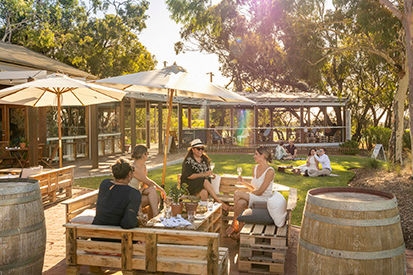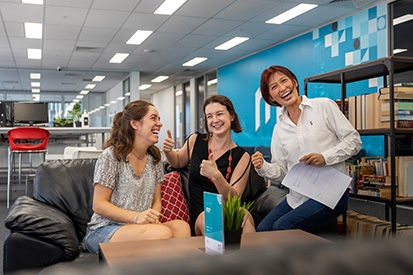Australian Export Awards a natural fit for Visitor Economy businesses
Now entering its 60th year, the Australian Export Awards has inspired countless companies in the visitor economy to adapt, innovate and diversify their export potential.
Many companies in the visitor economy are exporting the best in Aussie tourism, education, hospitality and business to the world. This makes them a perfect fit for the annual Australian Export Awards.
Now entering its 60th year, the Australian Export Awards celebrate exporters from diverse fields. Each are making significant contributions to the Australian economy.
Recognition has inspired countless companies in the visitor economy to adapt, innovate and diversify their exporting potential. We asked two businesses that were recognised in the 59th Australian Export Awards about their experiences.
Taking the South Australian wine experience to the world
Based in McLaren Vale, South Australia, Bec Hardy Wines (BHW) carries in its name hundreds of years of winemaking heritage.
Managing Director Bec Hardy officially launched BHW in 2020. She took over the 4-decade-old Pertaringa brand from her father.
BHW now exports to 12 markets. On home turf, the visitor economy aspect of the business supports its export ambitions.
‘Our domestic presence, of which the visitor experience is a key part, builds a strong foundation for our export business. A strong, authentic brand at home will resonate overseas,’ says Hardy.
‘We have more work to do over the next 5-plus years to continue to build that strong foundation. We want to take our wines to more international markets on the back of that domestic growth and success.’
A strong visitor economy offering boosts exports
Hardy says it was important to develop her visitor economy offering after launching her company.
‘Customers are increasingly looking for something different,’ she says. ‘They often want the whole package of wine, food and experience. It’s important to have a finger on the pulse and move with market demand.
‘We have refurbished the Pertaringa cellar door and introduced unique, new tasting experiences. We will also be launching a food option later this year.’
Hardy and her family have also opened their private home, Tipsy Hill, to offer intimate, one-of-a-kind dinners to guests.
‘This is an up-close-and-personal opportunity for people to get to know us and the brand,’ says Hardy. ‘We’re also offering premium picnic experiences, garden tours, weddings, corporate and private events at both Pertaringa and Tipsy Hill.’
The Australian Export Awards offers a unique selling point
Hardy doesn’t hesitate to encourage other visitor economy businesses to enter the Australian Export Awards.
‘It demonstrates to our distributors and potential distributors that we are successful in exporting at the highest level,’ she says.
‘The achievement is another unique selling point (USP) to add to the kitbag that separates us from other South Australian and Australian wine business. The more USPs we have, the more compelling our proposition becomes.’



Images courtesy of NIET Group (left and right) and Bec Hardy Wines (middle)
Exporting Aussie-made education experiences
Australian education is well regarded globally for its high standards, comprehensive curriculum, and quality teaching staff. This makes education providers important members of the visitor economy and the exporting sector.
NIET Group services international students looking for high-quality, high-support vocational training experiences at an accessible price. The Brisbane-based collective of vocational colleges boasts 5 campuses across Queensland and Tasmania. It has 50 programs, more than 250 packages and over 35,000 graduates.
NIET Director Troy Yue says there is a natural link between exporting and the visitor economy. For NIET, export is visitors.
‘As an international training entity, our “visitors” are our international students,’ he says.
‘Export (or visitors) is a major revenue stream for our company. The visitor experience is vital in terms of sustainability.’
Yue points out that long-term international students need a strong support network in Australia.
‘Services and logistical support, as well as overcoming cross-cultural and linguistic barriers, are features of the business that need constant vigilance. Despite the challenges, we remain focused on the opportunities the export industry brings.’
A rewarding experience at the Australian Export Awards
Being a finalist in the Australian Export Awards has contributed to NIET’s success in unexpected ways.
‘The prestige of the awards is well known. This has helped us accelerate expansion through new partnerships and opportunities,’ Yue says.
Being a finalist in the awards also had an immediate impact on the NIET team.
‘It strengthens our resolve to lead the way and uphold our vision to succeed, continuously improve and innovate better education and training services,’ says Yue.
‘I would encourage any business undertaking export activities to consider entering the Export Awards. It is an experience you will find very rewarding.’


